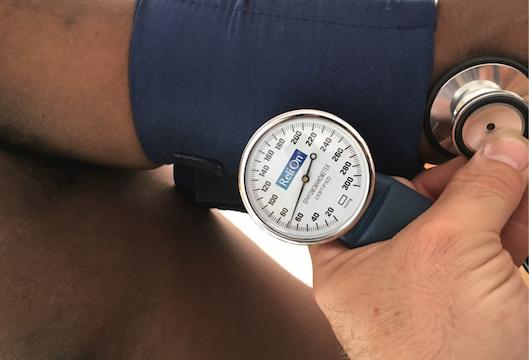
November 16, 2018 — A research team led by scientists and doctors in Leicester and the Netherlands has shown that a urine test to measure whether patients are taking their medications will save the the U.K. National Health Service (NHS) money.
The research, published in the American Heart Association (AHA) journal Hypertension, was conducted in collaboration between the University of Leicester, Leicester’s Hospitals and University of Groningen, Netherlands.
Hypertension affects nearly one third of the population. Between 30 and 50 percent of patients with hypertension do not take all their medications as prescribed. It is estimated that this non-adherence costs the NHS millions of pounds in managing poor health outcomes and ordering costly tests to find out why patients’ blood pressure is not reduced.
The team led by Dr. Pankaj Gupta and Dr. Prashanth Patel, researchers based at the University of Leicester and Leicester’s Hospitals, has developed an innovative screening test which can detect non-adherence for 40 of the most commonly used blood pressure medications, all from a single urine sample. They have previously shown that using the test has positive results with blood pressure dropping by around 20 points (the equivalent of 2 new medications) once the results of the tests were discussed with non-adherent patients.
This study builds on from the previous research by modeling the health economics of using the test in patients with hypertension. The new study shows that performing the urine test would not only lead to improvements in the care of people with hypertension, but that it is also highly likely to be cost-effective.
Using the best available data, the modelling predicts that in a cohort of 10,000, 65-year-old male hypertensive patients, using the urine test would save £495 per person screened, and prevent more than 500 heart attacks and 300 strokes. This is because non-adherence to prescribed hypertension drugs has been shown to correlate with a higher risk of cardiovascular events. The savings are thought to be even greater for younger hypertensive patients.
“Clinically we know that the urine test is very useful in patient care," said Gupta, the senior co-author of the paper from the University of Leicester’s Department of Cardiovascular Sciences and co-director of the National Centre for Drug Adherence Testing (NCAT) based at Leicester’s Hospitals. "The new 2018 European Society of Cardiology (ESC) and European Society of Hypertension (ESH) Guidelines have also recently supported the use of this novel test to assess non-adherence. We are very pleased to show that urine biochemical screening is extremely cost-effective and hence we can now recommend its wider adoption.”
“Non-adherence to prescribed medications not only costs the NHS huge amounts of money, it also leads to adverse outcomes for patients. Our novel biochemical test is robust and simple to use in busy clinics," said Patel, co-author of the paper, Co-Director of NCAT and Honorary Senior Lecturer at the University of Leicester.
The urine test was established in 2011 and NCAT receives samples from around 33 NHS hospitals across the U.K. It is foreseen that with the new ESC-ESH guidelines and results of this study the use of this test will be adopted by more hospitals and GP practices in the U.K. and abroad.
“Non-adherence is a major problem globally in people with chronic conditions such as hypertension, diabetes and heart disease," said Kamlesh Khunti, professor of primary care diabetes and vascular medicine at University of Leicester, director of the National Institute for Health Research (NIHR) CLAHRC East Midlands and a study co-author. "The aging population means that greater numbers of people are living with more than one chronic condition, so taking more tablets, which is leading to poor adherence. This study for the first time shows that a targeted simple assessment of people who are likely to be non-adherent and then intervening would lead to improved outcomes that are cost-effective for the NHS.”
The paper, “Cost-utility of an objective biochemical measure to improve adherence to antihypertensive treatment”, was published in Hypertension in October 2018.


 November 12, 2025
November 12, 2025 









